Deliverable available: Report on financing approaches conducive to water sector innovation
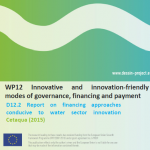 The DESSIN project aims to demonstrate and promote innovative solutions to water-related challenges with a focus on (i) water quality issues related to the implementation of the Water Framework Directive (WFD), and (ii) water scarcity. Work Package 12 of DESSIN specifically aims at identifying innovative and innovation-friendly modes of governance, financing and payment. The implementation of economic policy instruments (EPIs) in water management has strong potential for creating comparatively rapid changes in the attractiveness and uptake of new technologies by the private sector.
The DESSIN project aims to demonstrate and promote innovative solutions to water-related challenges with a focus on (i) water quality issues related to the implementation of the Water Framework Directive (WFD), and (ii) water scarcity. Work Package 12 of DESSIN specifically aims at identifying innovative and innovation-friendly modes of governance, financing and payment. The implementation of economic policy instruments (EPIs) in water management has strong potential for creating comparatively rapid changes in the attractiveness and uptake of new technologies by the private sector.
Deliverable available: Guidelines for packaged plant selection and optimisation
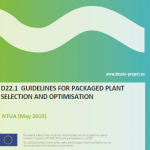 Deliverable D22.1 generally deals with subjects related to water reuse in large urban areas. More specifically, the deliverable focuses on new membrane solutions and technologies in the form of modular packaged treatment solutions (MPTS). The treatment level required is determined by the specific quality objectives for unrestricted urban wastewater reuse, identified in the relevant national legal framework, whereas different capacities of MPTS are designed at preliminary level accompanied by technical and operational considerations.
Deliverable D22.1 generally deals with subjects related to water reuse in large urban areas. More specifically, the deliverable focuses on new membrane solutions and technologies in the form of modular packaged treatment solutions (MPTS). The treatment level required is determined by the specific quality objectives for unrestricted urban wastewater reuse, identified in the relevant national legal framework, whereas different capacities of MPTS are designed at preliminary level accompanied by technical and operational considerations.
Membrane technology boosts freshwater recovery upon aquifer storage
 Aquifer storage and recovery (ASR) of freshwater surpluses in brackish or saline aquifer suffers from freshwater losses upon mixing. In combination with desalination using reverse osmosis, freshwater recovery can be boosted up to 100% of the injected freshwater. At the DESSIN Westland demo site, the high-end ASR and RO technologies are integrated for the first time in order to obtain an optimal, robust, and sustainable ecosystem service.
Aquifer storage and recovery (ASR) of freshwater surpluses in brackish or saline aquifer suffers from freshwater losses upon mixing. In combination with desalination using reverse osmosis, freshwater recovery can be boosted up to 100% of the injected freshwater. At the DESSIN Westland demo site, the high-end ASR and RO technologies are integrated for the first time in order to obtain an optimal, robust, and sustainable ecosystem service.
First visitors for the Westland ASR Showcase in Holland
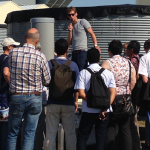 The 36th International Association for Hydro-Environmental Engineering and Research (IAHR) visited relevant water innovations on July 1st. About 130 people from the international water sector selected the DESSIN showcase in the Westland, where rainwater surpluses are stored and currently recovered for irrigation. Visitors were first invited to the inside information centre with relevant background information and information on related systems in the Netherlands provided by Marcel Paalman (KWR). The second part of the visit consisted of a demonstration of the system in the field (Koen Zuurbier, KWR). Here, information signs were placed to provide a clear explanation of this ecosystem service.
The 36th International Association for Hydro-Environmental Engineering and Research (IAHR) visited relevant water innovations on July 1st. About 130 people from the international water sector selected the DESSIN showcase in the Westland, where rainwater surpluses are stored and currently recovered for irrigation. Visitors were first invited to the inside information centre with relevant background information and information on related systems in the Netherlands provided by Marcel Paalman (KWR). The second part of the visit consisted of a demonstration of the system in the field (Koen Zuurbier, KWR). Here, information signs were placed to provide a clear explanation of this ecosystem service.
Emschergenossenschaft introduces DESSIN to German water sector
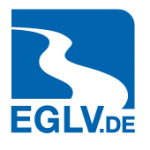 Members of the Emschergenossenschaft introduced the DESSIN project at a number of meetings, workshops and conferences in Germany during the last few months.
Members of the Emschergenossenschaft introduced the DESSIN project at a number of meetings, workshops and conferences in Germany during the last few months.
The Emscher case was presented to an audience of about 1000 people at the Essener Tagung für Wasser- und Abfallwirtschaft in April 2015, which was about water and waste water management and had the motto “Research meets practice”.
Large 18 months meeting of DESSIN in Germany
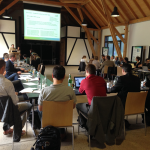 After a year and a half of work, about 40 European DESSIN partners met to present the first results and to confirm that the project flows according to the path taken at the beginning of 2014. For two days in June, project partners from Adelphi, Amphos21, Bruine de Bruin, CETaqua, DHI, Ecologic Institute, Emschergenossenschaft, EYDAP, Inrigo Water, IWW, KWR, LKI, National Technical University of Athens, SEGNO, SINTEF, TELINT, UFT and the University of Duisburg-Essen (plus a member of the Project Advisory Committee) gathered near Dortmund in Germany.
After a year and a half of work, about 40 European DESSIN partners met to present the first results and to confirm that the project flows according to the path taken at the beginning of 2014. For two days in June, project partners from Adelphi, Amphos21, Bruine de Bruin, CETaqua, DHI, Ecologic Institute, Emschergenossenschaft, EYDAP, Inrigo Water, IWW, KWR, LKI, National Technical University of Athens, SEGNO, SINTEF, TELINT, UFT and the University of Duisburg-Essen (plus a member of the Project Advisory Committee) gathered near Dortmund in Germany.
3rd Newsletter launched
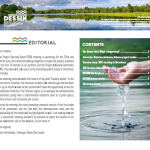 The FP7-funded DESSIN project launched its third newsletter, which describes the overall progress of the project after a year and a half.
The FP7-funded DESSIN project launched its third newsletter, which describes the overall progress of the project after a year and a half.
The highlight of the newsletter is an interview with the Demo Site leader of Athens (Greece), Katerina Antoniou, about the progress and the work done at the demo site. Also to be found in the newsletter is a description of the transformation of the city of Aarhus in Denmark, which is a DESSIN “mature site”, a technological contribution by SEGNO and a short piece about the internal DESSIN meeting in Barcelona.
SME peer learning workshop
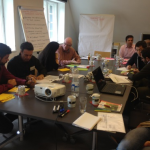 As part of DESSIN’s route to market activities, a business-to-business (B2B) workshop was carried out in Germany on June 23rd, 2015. During this workshop, the DESSIN SMEs had the opportunity to network, learn about market characteristics of the other DESSIN countries, identify room for collaboration and to exchange their views on SME-specific market challenges. The workshop was organized by adelphi in a peer learning format.
As part of DESSIN’s route to market activities, a business-to-business (B2B) workshop was carried out in Germany on June 23rd, 2015. During this workshop, the DESSIN SMEs had the opportunity to network, learn about market characteristics of the other DESSIN countries, identify room for collaboration and to exchange their views on SME-specific market challenges. The workshop was organized by adelphi in a peer learning format.
DESSIN milestone (MS)16 finalized
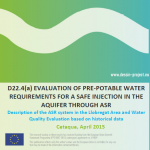 DESSIN has achieved another milestone, MS16, by completing the definition of most suitable pre-potable water and expected impacts in groundwater. Sand filtered waters have been selected and characterised, being compared with native groundwater and using international standards and recommendations coming from almost 40 ASR sites. Results are summarised in D22.4.a, as a part of the deliverable D22.4. It is already available in the website, just follow this link.
DESSIN has achieved another milestone, MS16, by completing the definition of most suitable pre-potable water and expected impacts in groundwater. Sand filtered waters have been selected and characterised, being compared with native groundwater and using international standards and recommendations coming from almost 40 ASR sites. Results are summarised in D22.4.a, as a part of the deliverable D22.4. It is already available in the website, just follow this link.
The evaluation of sand filtered water has been done in order to know the strengths and weaknesses of this pre-potable water chosen in the Llobregat site to forecast the operation of the demonstration phase that it is going to be implemented in following project tasks. This is a significant point in the Llobregat case development, as it will state the key parameters for the monitoring in the demonstration phase.
“Route to market” workshops carried out
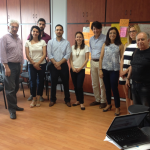 As part of DESSIN’s “Route to market“ activities, several workshops have been carried out with the DESSIN SMEs this spring. The objective was to identify opportunities and barriers for the commercialisation of the DESSIN solutions and to further detail the commercialisation approach. Amongst others, the needs-based sessions between adelphi and the SMEs included discussions on key drivers & pressures for the sites; defining a value proposition in view of the ESS solution; identifying opportunities & barriers for further commercialization of the solution; assessing, categorizing and measuring the environmental benefits of the solution for ESS matching; analyzing the customer landscape and identifying potential business partners; narrowing down promising markets; identifying potential networks and fora for further lobbying and ultimately, defining the next steps of the market entry strategy. Workshops were mostly carried out as individual sessions; one site chose to have a joint workshop with all involved SMEs and partners.
As part of DESSIN’s “Route to market“ activities, several workshops have been carried out with the DESSIN SMEs this spring. The objective was to identify opportunities and barriers for the commercialisation of the DESSIN solutions and to further detail the commercialisation approach. Amongst others, the needs-based sessions between adelphi and the SMEs included discussions on key drivers & pressures for the sites; defining a value proposition in view of the ESS solution; identifying opportunities & barriers for further commercialization of the solution; assessing, categorizing and measuring the environmental benefits of the solution for ESS matching; analyzing the customer landscape and identifying potential business partners; narrowing down promising markets; identifying potential networks and fora for further lobbying and ultimately, defining the next steps of the market entry strategy. Workshops were mostly carried out as individual sessions; one site chose to have a joint workshop with all involved SMEs and partners.